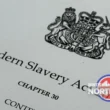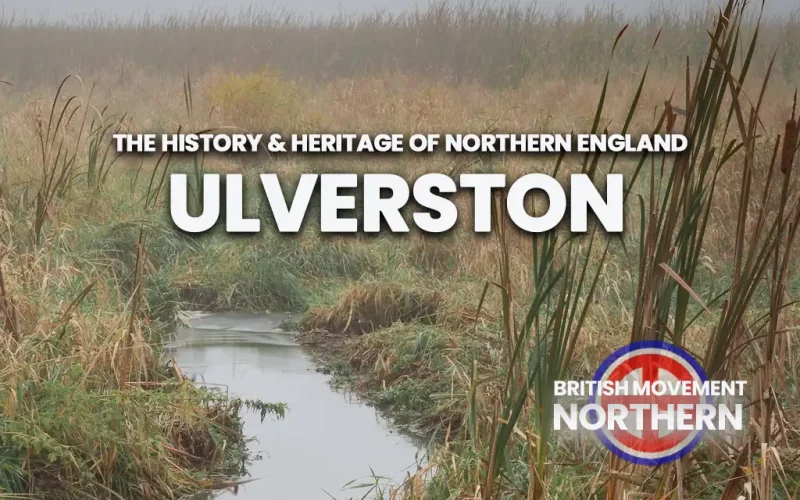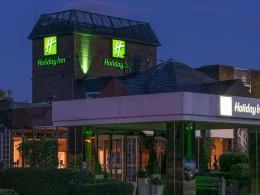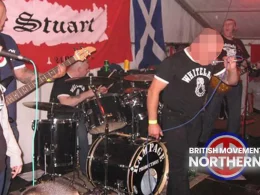Once again, a Northern market town where the name of the town was not finally settled until the 19th century.
It was not until 1888 that Ulverstone finally became officially known as Ulverston. Little is known of settlements in the Ulverston area prior to the Roman conquest of Britain, but throughout the Iron Age the area was under the control of the Celtic tribe, the Carvetii.
The first acknowledged settlement is recorded as being in 430 AD as a Saxon homestead or farm. According to the entry in the Domesday Book in 1086, it was built by a man called Ulfarr. The homestead was known as Ulvrestun – the farm of Ulfarr (wolf warrior). In records from 1127 the settlement is called ‘Olvestonam’ and some years later, in 1189 as ‘Ulvereston’.
In the same century, the parish church for Ulverston was established and built. St Mary’s Church stood for almost 400 years before disaster struck and the building was largely destroyed; however, the ruins were salvaged, and the present-day parish church was rebuilt on the earlier foundations in 1540.
In September 1280, the town was granted a Market Charter by King Edward the 1st, an important step forward for the town’s prosperity and a feature of the town up to the present day. Ulverston continues to celebrate its market town status with an annual Charter Festival.
Scottish control of the region fluctuated across the medieval period when various kings of Scotland sought to push their western borders down into Cumbria and Westmorland, more than once these incursions saw the town under brief Scottish rule.
In the 14th century, the infrequent raids and attacks by Scottish armies and war bands resulted in Ulverston being overrun, and twice in a one-hundred-year period, Scottish troops burned the town to the ground.
The town slowly recovered and rebuilt, its position on the Furness Peninsula and access to the Irish Sea helped its recovery and the town’s market gave the citizens a source of income. Education took root in Ulverston in 1658 when a local wealthy benefactor funded the founding of Town Bank Grammar School.
In the 17th century, Ulverston became the birthplace of the Quaker movement. In the 1660’s the religious reformer George Fox, one of the founders of the Quakers set up a base at Swarthmoor Hall on the outskirts of the town.
The Industrial Revolution saw Ulverston undergo a number of transformations, all of which benefitted the town and increased its prosperity. The condition of roads to and from the town improved, and in 1795 the Ulverston Canal was constructed, which became an additional route for shipping out to the Irish Sea.
The railways came to Ulverston in 1846 and increased the movement of freight and passengers through the town to the coastal ports. Ulverston became a setting off point for access to Liverpool, the Clyde and a mustering place for passengers waiting to join liners in the Irish Sea.
The establishment of local iron smelting works added to the town’s economic potential. However the population of the town did not expand as much as that of other northern towns undergoing industrialisation. The population of Ulverston grew but remained fairly stable.
One of Ulveston’s most famous sons was born in 1890. Stan Laurel, of the international comedy duo Laurel and Hardy, was born and raised in Ulverston, a bronze statue of Stan Laurel and Oliver Hardy stands in the town, and there is a Laurel and Hardy Museum in Ulverston.
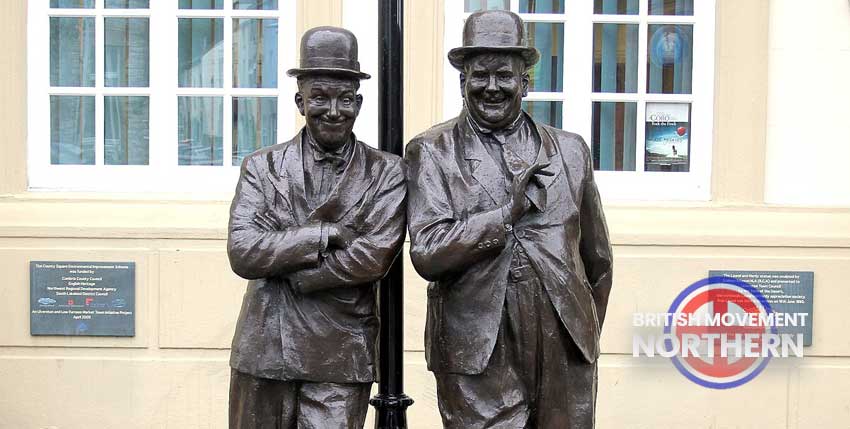
Ulverston was a Lancashire town until local government restructuring in 1974, when the town was re-classified as being in Cumbria. Stan Laurel always referred to his being born in “Ulverston, Lancashire”.
Ulverston is a White town; the most recent census data (2011) gives the population breakdown as White British and other White nationalities, which includes Irish and Eastern Europeans, as 97.8% White, a clear recommendation.
Resources
Top Image: BM Northern
Lower Image: Hilton Teper, CC BY-SA 3.0, via Wikimedia Commons.
The British Movement welcomes articles for possible inclusion on this site from members and supporters across the North of England. Please remember that we have to operate within the laws of this country – we will not include any content that is against the current laws of the United Kingdom. News reports should be topical and be relevant to the regions covered by this website.


